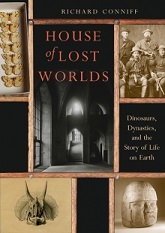Elephants and Ostracism
Posted by Richard Conniff on July 28, 2012
I like this account of elephant behavior from the New York Times “Scientist at Work” series. Biologists used to scrupulously contend, despite the evidence in their own private conversations, that animals have no personality, no individuality. Now scientists like O’Connell-Rodwell acknowledge that animals’ lives can be as messy and complex as our own:
The Darker Side of Elephant Country
By CAITLIN O’CONNELL-RODWELLCaitlin O’Connell-Rodwell, who teaches at the Stanford University School of Medicine, writes from Etosha National Park in Namibia, where she is studying elephant societies.
Monday, July 23
Something ugly has arisen in elephant country. These animals are revered for their gentle nature, for their nurturing and for their reputation as sentient beings. But they can be just like humans when it comes to fighting over limited resources, and it is hard to watch. What we are experiencing with elephant family group behavior at Mushara conjures images of bad human behavior under a set of unique pressures and under conditions of great duress. In this bleak environment, with very little available water right now, elephant families are not only pitted against other families but also against each other.
I spent half the night worrying about Paula’s little baby, Bruce. Paula, a young female, is being ostracized by her family for reasons not easily discernible. And the more time this family spends at Mushara, the more horrified we have become with their behavior not only toward Paula, but also toward her calf. Having seen him get swatted by a preteen male, it struck me just how bad the situation must be for little Bruce.
Normally a fragile baby like this would be coddled by everyone in the family. One always thinks about the glory days of an elephant calf’s youth, growing up with caring mothers, watchful aunts and playful siblings and cousins. But the behavior of Mia and the Athlete family against Paula and her baby was deplorable. Each time Paula sought the comfort of the inner circle of the family, she was immediately pushed out by one of the other females. Paula was forced to the edge of the pan where Bruce bathed on his own, without the pleasure of other contemporaries to share in the experience. He splashed his trunk in play all by himself. There was one brief moment during the visit where another baby approached with a trunk-to-mouth greeting, but the encounter was short-lived as the other baby was ushered off.
In great contrast to this familial rejection, the family was able to unite under a different kind of crisis: a baby had fallen into the trough. Suddenly, the whole family was engaged, some panicking, running back and forth as they watched the baby swim, uncertain of what to do as its mother pushed others out of the way. Then, finally, the matriarch, Mia, knelt down and scooped the baby out with her trunk between its little hind legs. With the crisis averted, a large contingent gathered around to soothe the wee one. In that moment, I wondered what would have happened if it had been Paula’s baby that fell in. Would the family have rallied together in rescue, or would they have stood back and watched Paula handle the crisis on her own?
In other places in Africa, where poaching has caused a breakdown of family structure and the merging of unrelated females into makeshift groups, the kind of behavior that we have witnessed from this family toward Paula might make sense in the confusion of rebuilding family ties. But the elephants of Etosha National Park are fortunate enough not to have experienced such things. We have photo evidence that Paula has been in the Athlete family for at least the past five years, as long as we’ve known this family.
I can’t help wondering, after seeing the darker side of nature, if we might see the horrors of our own species more clearly by witnessing those of others. Can we take these opportunities to see a piece of ourselves in the mirror and recognize our own foibles? I couldn’t help being reminded of the fragility of our own social situations and the importance of friends and loved ones. This insight helped make observing the darker side of nature more bearable. But the more I watch, the more I hope for the ugliness of elephant country to subside.
This entry was posted on July 28, 2012 at 6:14 am and is filed under Social Status. You can follow any responses to this entry through the RSS 2.0 feed. You can leave a response, or trackback from your own site.





Jan said
Sad to learn of this atypical elephant behavior, and equally sad to consider how this may foreshadow human behavior when resources become scarce. This scenario has lurked in the back of my mind since I saw the movie “Soylent Green” nearly 40 years ago. The “soylent green” ingredient was supposed to be the movie shocker, but I was more alarmed by the eventuality of overpopulation and insufficent resouces.
LikeLike